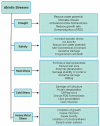Using Exogenous Melatonin, Glutathione, Proline, and Glycine Betaine Treatments to Combat Abiotic Stresses in Crops
- PMID: 36361700
- PMCID: PMC9657122
- DOI: 10.3390/ijms232112913
Using Exogenous Melatonin, Glutathione, Proline, and Glycine Betaine Treatments to Combat Abiotic Stresses in Crops
Abstract
Abiotic stresses, such as drought, salinity, heat, cold, and heavy metals, are associated with global climate change and hamper plant growth and development, affecting crop yields and quality. However, the negative effects of abiotic stresses can be mitigated through exogenous treatments using small biomolecules. For example, the foliar application of melatonin provides the following: it protects the photosynthetic apparatus; it increases the antioxidant defenses, osmoprotectant, and soluble sugar levels; it prevents tissue damage and reduces electrolyte leakage; it improves reactive oxygen species (ROS) scavenging; and it increases biomass, maintains the redox and ion homeostasis, and improves gaseous exchange. Glutathione spray upregulates the glyoxalase system, reduces methylglyoxal (MG) toxicity and oxidative stress, decreases hydrogen peroxide and malondialdehyde accumulation, improves the defense mechanisms, tissue repairs, and nitrogen fixation, and upregulates the phytochelatins. The exogenous application of proline enhances growth and other physiological characteristics, upregulates osmoprotection, protects the integrity of the plasma lemma, reduces lipid peroxidation, increases photosynthetic pigments, phenolic acids, flavonoids, and amino acids, and enhances stress tolerance, carbon fixation, and leaf nitrogen content. The foliar application of glycine betaine improves growth, upregulates osmoprotection and osmoregulation, increases relative water content, net photosynthetic rate, and catalase activity, decreases photorespiration, ion leakage, and lipid peroxidation, protects the oxygen-evolving complex, and prevents chlorosis. Chemical priming has various important advantages over transgenic technology as it is typically more affordable for farmers and safe for plants, people, and animals, while being considered environmentally acceptable. Chemical priming helps to improve the quality and quantity of the yield. This review summarizes and discusses how exogenous melatonin, glutathione, proline, and glycine betaine can help crops combat abiotic stresses.
Keywords: abiotic stress; antioxidants; drought; glutathione; glycine betaine; heat; heavy metals; melatonin; proline; salinity.
Conflict of interest statement
The authors declare no conflict of interest.
Figures
References
-
- Hasanuzzaman M., Nahar K., Hossain M.S., Anee T.I., Parvin K., Fujita M. Nitric Oxide Pretreatment Enhances Antioxidant Defense and Glyoxalase Systems to Confer PEG-Induced Oxidative Stress in Rapeseed. J. Plant Interact. 2017;12:323–331. doi: 10.1080/17429145.2017.1362052. - DOI
-
- Imran M., Latif Khan A., Shahzad R., Aaqil Khan M., Bilal S., Khan A., Kang S.-M., Lee I.-J. Exogenous Melatonin Induces Drought Stress Tolerance by Promoting Plant Growth and Antioxidant Defence System of Soybean Plants. AoB Plants. 2021;13:plab026. doi: 10.1093/aobpla/plab026. - DOI - PMC - PubMed
-
- Koh Y.S., Wong S.K., Ismail N.H., Zengin G., Duangjai A., Saokaew S., Phisalprapa P., Tan K.W., Goh B.H., Tang S.Y. Mitigation of Environmental Stress-Impacts in Plants: Role of Sole and Combinatory Exogenous Application of Glutathione. Front. Plant Sci. 2021;12:791205. doi: 10.3389/fpls.2021.791205. - DOI - PMC - PubMed
Publication types
MeSH terms
Substances
LinkOut - more resources
Full Text Sources



